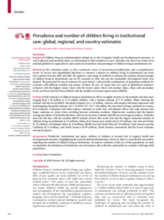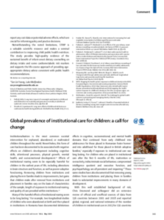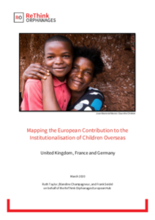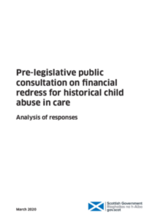Displaying 301 - 310 of 1510
This research aimed to construct an explanatory theory of how residential staff make sense of, and use, attachment theory in practice.
The purpose of this study is to describe the emotional and behavioural status and the associated factors among inmates aged 11-16 years of children’s homes in the Gampaha Probationary Division of Sri Lanka.
The aim of this study was to estimate global-level, regional-level, and country-level numbers and percentages of children living in institutional care.
This comment piece by Charles H Zeanah and Kathryn L Humphreys accompanies a study on the number of children in institutional care around the globe, entitled 'Prevalence and number of children living in institutional care: global, regional, and country estimates,' published in the Lancet in March 2020.
The goal of this study is to analyze the profile of 353 adolescents in TRC in Spain.
The purpose of this study was to examine the lived experiences of posttraumatic growth (PTG) in adult survivors of institutional childhood abuse in Ireland.
Significant anecdotal evidence suggests that other countries across Europe also make a considerable contribution to the supply chain of people, money and resources that continue to sustain and foster the orphanage industry worldwide. This report seeks to map the contribution of the three countries in Europe with the largest volunteer travel markets: The United Kingdom, Germany and France.
This paper contributes to the growing body of work which argues that residential child care is a positive choice and that it has a key role to play in positive identity formation.
This report presents findings from an independent analysis of the responses to a public consultation issued by the Scottish Government in September 2019, which invited views on its specific proposals for the establishment of a statutory financial redress scheme for victims / survivors of abuse in care.
The purpose of this study was to investigate the emotional and behavioral problems of children living in child care institutions (CCIs) in Kandy District, Sri Lanka, and to explore associated factors.





